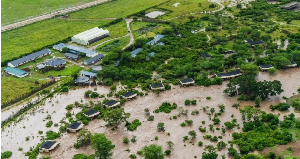- Home - News
- TWI News | TV
- Polls
- Year In Review
- News Archive
- Crime & Punishment
- Politics
- Regional
- Editorial
- Health
- Ghanaians Abroad
- Tabloid
- Africa
- Religion
- Election 2020
- Coronavirus
- News Videos | TV
- Photo Archives
- News Headlines
- Press Release
General News of Monday, 16 December 2013
Source: Samuel Hinneh
GMOS are enhanced materials - CSIR boss declares
Competing voices bombard consumers, farmers and policy makers in Ghana as the country decides whether to accept genetically modified crops.
One prominent voice comes from Dr Abdullah Salifu, Director General of the Council for Scientific Industrial Research. He said that the application of biotechnology in agriculture basically deals with improving the productivity of crops to provide high yields for farmers to achieve food security.
“The point is you identify a problem of productivity in agriculture of a particular crop and then you seek to look at how you can enhance the issues that are not giving you the optimum yield that you expect,” he said in an interview at a workshop on biotechnology in Tamale.
An advocacy movement organisation in Ghana, Food Sovereignty Ghana (FSG), says there has been no testing for the safety of GMOs in human diet. The organisation cites health problems associated with the consumption of GMOs such as infertility, accelerated aging, deregulation of genes associated with cholesterol synthesis, insulin regulation, cell signalling, and protein formation, and changes in the liver, kidney, spleen and gastrointestinal system.
In terms of safety of GMOs foods, rigorous and intensive safety checks are conducted for environmental and human safety under international safety practices before released for human consumption, therefore devoid of any safety hazards, he emphasised.
Godwin Lemgo, Programme Officer, Food Safety of the African Biosafety Network of Expertise of African Union/NEPAD says GMO foods are the most tested in food history, and follow international guidelines such as testing for toxins, allergies, long term health effects, and checked by regulators wherever the GMO crops application is submitted, before released for human consumption.
Even though there are concerns raised against GMOs, Dr Salifu believes that it should be based on the facts, hence failure to produce specific details of the concerns raised against the technology then becomes a problem.
“We need to be careful especially those in Ghana who want to portray GMOs as the worst thing that will ever happen to us, let’s get comfortable with the facts and figures on the issue before we make pronouncements,” Dr Salifu said.
“In Africa, the arrangements in place is that the intellectual property regarding those materials are going to be negotiated and given to us free of charge for us to use in studies to improve local materials.
“For the intellectual property there are various organisations in Africa for example the Africa Agriculture Technology Foundation in Nairobi Kenya that negotiates intellectual property for Africans to use, for instance the bt cowpea is free of charge and eventually will be put out there for farmers to use at no cost to the farmers,” Dr Salifu emphasised.
Margaret Karembu, the Director of International Service for the Acquisition of Agri-Biotech Application (ISAAA) AfriCenter says the government of Ghana has made the right decision to pass the Biosafety Law, to allow biotechnology application in agriculture.
“Already Burkina Faso, the neighbouring country is already growing bt cotton, and it will be unfortunate if Ghanaian farmers are not able to access that technology because they become less competitive against their Burkinabe farmers.”










